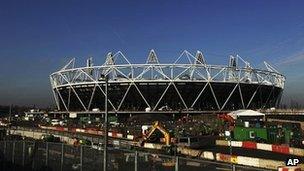London 2012: Reservists called up to boost security
- Published

Olympic venues will be visited by millions of people over two weeks in the summer
Armed forces reservists are being called up to boost security for this summer's London Olympics.
The government said 2,100 personnel would help ensure the Games, which begin in late July, are safe.
Altogether, up to 13,500 military staff will be on duty during the busiest periods of sporting action.
The Ministry of Defence said it would select reservists with "supportive employers" to minimise the impact of their deployment on businesses.
Almost nine million tickets are being sold for Olympic events, with more than 10,000 athletes taking part.
'Expertise'
In December ministers almost doubled the security budget for the Games from £282m to £553m.
Defence Secretary Philip Hammond described the Olympics as the "biggest security challenge this country has faced for decades".
Territorial Army and Royal Navy, Royal Air Force and Royal Marine reservists are being called up under the terms of the 1996 Reserve Forces Act.
A Ministry of Defence statement said: "Some reservists will provide a range of specialist capabilities and expertise, while the majority will form part of the support to Olympic venue security operations.
"Defence will continue to apply its policy of intelligent selection, designed to identify, in good time, volunteer reservists with supportive employers with the training, skills and availability in order to minimise the impact of mobilisation upon the individual, their family and employer."
There are currently almost 600 reservists serving in Afghanistan, about 6% of total UK forces in the country.
The government said: "Whilst the Olympics will be a focal event for the nation in 2012, the operation in Afghanistan will remain the main effort for defence. Reservists will continue to be a key contributor to that and other ongoing overseas operations."
The Ministry of Defence said the deployment arranged for the Olympics was "on a similar scale" to that by "other nations at recent Olympic Games".
It added that their presence would help ensure a "safe, secure and enjoyable 2012 Olympics".
The order for their deployment ends on 20 September.
- Published19 January 2012
- Published15 December 2011